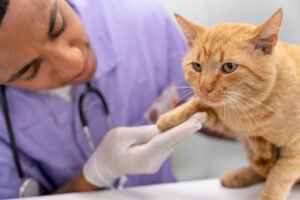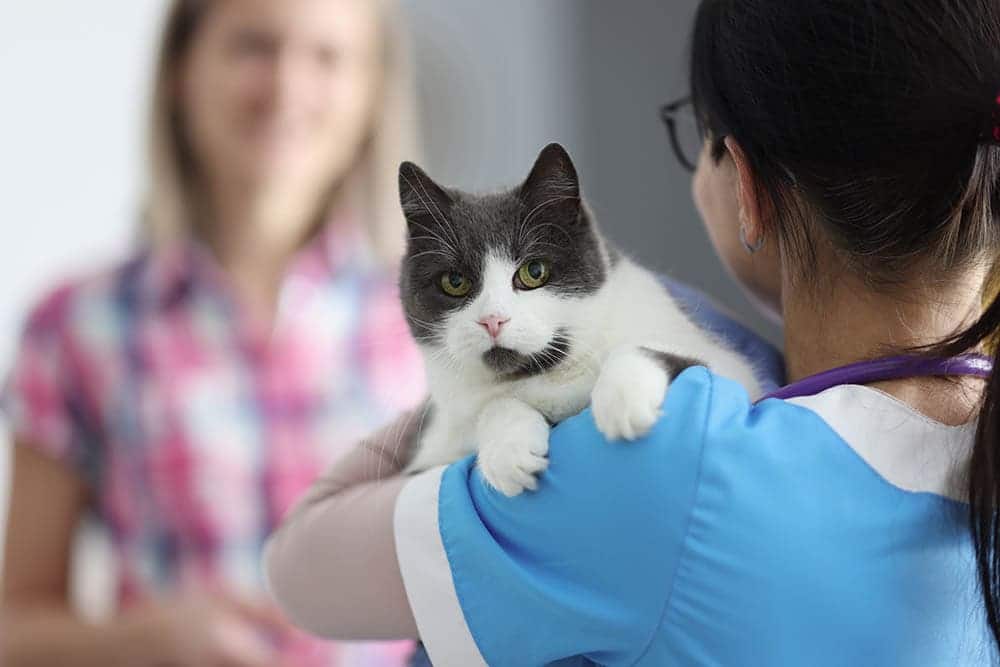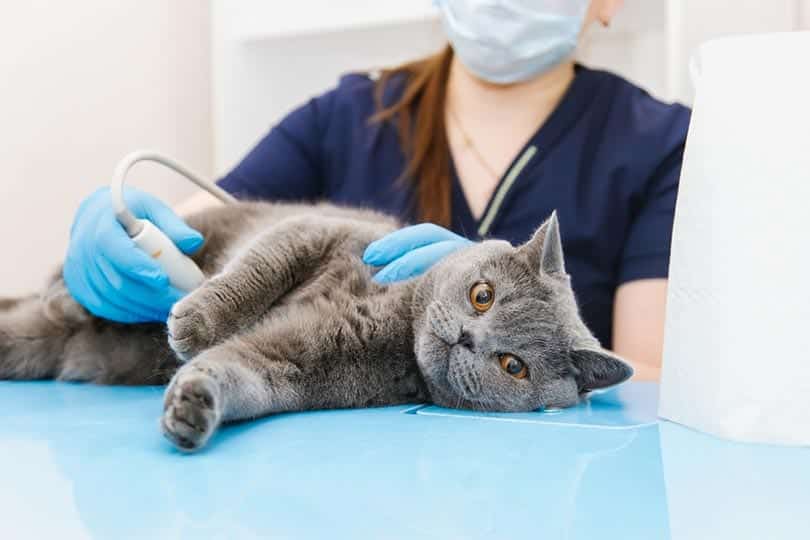My Cat Ate Dental Floss: Is It Dangerous? Our Vet Explains What to Do
There is no denying that cats are curious creatures. We find them getting themselves into all sorts of mischief, from playing with snakes to rummaging through garbage cans. Trash can often be viewed as an enticing toy or a tasty snack to a cat. So, what happens if your cat has managed to get into the garbage and consumes dental floss? Is this dangerous?
The answer is, unfortunately, yes. The ingestion of dental floss could lead to a linear foreign body in your cat, one of the more dire types of foreign body ingestions. Continue reading to learn more about the risks associated with dental floss ingestion and linear foreign bodies.

Linear Foreign Bodies in Cats
Long, thin objects that are inappropriately consumed are called linear foreign bodies. String, rope, dental floss, cloth, and ribbon are examples of potential linear foreign bodies. What typically occurs in linear foreign body ingestion, or in this case, floss ingestion, is that the foreign object becomes embedded or stuck within the gastrointestinal tract. The natural movements of the intestines through peristalsis will attempt to propel the foreign object through the digestive tract. Intestinal bunching ends up occurring, leading to intense pain and intestinal damage. As damage occurs to the intestines and tension on the object increases, there is a risk of perforation of the gastrointestinal tract.
In some cases of linear foreign bodies, the object may be seen wrapped around the base of the tongue or seen exiting the rectum. It is important to never attempt to remove the string without the help of a veterinarian.

My Cat Just Ate Floss, What Should I Do?
The first thing to do after your cat has ingested floss or another type of linear foreign object is to call your veterinarian. Your veterinarian will likely ask several questions to help develop a plan for your pet.
In some cases, your veterinarian may recommend close monitoring at home, whereas in other situations, your veterinarian may recommend you bring your cat to the clinic. Cats are notoriously harder to induce vomiting in, and as a result, your veterinarian may recommend endoscopy to retrieve the object from the stomach, especially if ingestion just occurred.
Signs of a Linear Foreign Body
Signs can vary amongst patients, and owners sometimes are not aware that ingestion of a foreign object has occurred.
Signs that can be seen with linear foreign bodies include:
- Reduced appetite
- Vomiting
- Lethargy
- Discomfort
- Constipation
Diagnosing a Linear Foreign Body
If your pet has experienced signs associated with a foreign body, or if there is a recent history of ingestion of a foreign body like floss, radiographs will be recommended. Unfortunately, things like dental floss can be difficult to identify on radiographs, as the foreign object itself is usually not visible. The appearance of the intestines will be closely evaluated by the veterinarian to better determine if intestinal bunching has occurred, which is commonly seen with linear foreign bodies.
If there is a high suspicion of a linear foreign body but radiographs do not provide a definitive diagnosis, an ultrasound or exploratory surgery may be recommended to evaluate the gastrointestinal tract.

Treatment of a Linear Foreign Body
In some cases, linear foreign bodies can pass through the intestinal tract without causing havoc. The problem is that there is no way to determine which patients will be able to pass the string or floss without complications.
Linear foreign bodies can occasionally be removed through the induction of vomiting and endoscopic retrieval if recent consumption of the string has occurred.
If problems arise from ingestion of floss or another type of linear foreign object, surgery will likely be recommended. As with most foreign body surgeries, the sooner the surgery can occur after the patient has been stabilized, the better. Following foreign body surgery, your cat will need to be kept inactive and treated with appropriate medications. Additionally, a temporary diet change may be necessary.
How Can I Prevent Ingestion of Floss or Other Linear Foreign Objects?
Unfortunately, the chances are high that your cat will ingest something they shouldn’t at some point in their lives. Setting them up for success is imperative to their safety. What exactly does that mean?
Try making it very difficult for your cat to have access to potentially harmful items like floss by disposing of them properly in a trash can with a lid. Alternatively, it would be worthwhile to avoid linear floss altogether and try using a floss pick instead. Removing access to bathrooms is helpful by keeping doors closed. Before leaving the house, performing a quick check of the house is helpful in identifying potential hazards.


In Summary
If your cat has ingested dental floss, there is a risk of developing gastrointestinal complications. If possible, schedule an appointment with your veterinarian to evaluate your cat and to check for floss that may be wrapped around the base of the tongue. Unfortunately, some cats do require surgery after the consumption of a linear foreign object like dental floss. The prognosis is dependent on the duration of clinical signs and the damage endured to the intestinal tract. Try avoiding using potentially harmful things like dental floss in your home to minimize the chances of ingestion by a curious cat.

